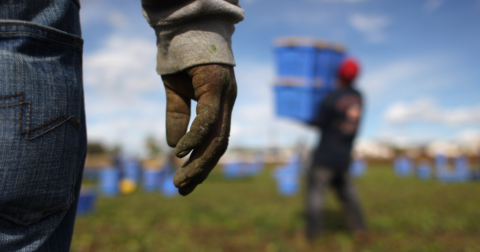Feature
Dairy and Meat Industries Push for Access to H-2A Farmworkers While the Trump Administration Slashes Their Pay
Policy•13 min read
Feature
Michigan’s Supreme Court heard oral arguments challenging the decades-long precedent.


Words by Nina B. Elkadi
A lawsuit before Michigan’s Supreme Court alleges that, for 17 years, undocumented workers have been illegally denied benefits when injured on the job. The suit was filed by the Michigan Immigrant Rights Center in 2022, challenging a decades-old decision that has served as legal precedent to deny these benefits. In the original case, two undocumented workers suffered workplace injuries and were denied compensation due to the “crime” of their undocumented status.
Undocumented employees often work in dangerous and difficult work environments, including slaughterhouse and meatpacking work. Agricultural jobs in slaughterhouses are some of the highest-risk labor in the United States, and the large corporations that control much of the meat sector in the U.S. rely on immigrant and migrant labor to keep plants running. However, the plaintiffs argue, in Michigan, employees are not protected if they are injured on the job.
Under Michigan caselaw, workers are only entitled to medical and wage loss benefits “until their undocumented status is identified.” Once the employer finds out, “wage loss benefits cease to be available.” If the appeal to the state’s Supreme Court is successful, the decision would make it so undocumented workers in Michigan are now eligible for benefits. The term “undocumented” refers to immigrants here in the U.S. without legal status.
“Justice for undocumented workers who keep their neighbors housed and fed is at stake, and so are the rights of all Michiganders to challenge their state’s illegal conduct in court,” David Muraskin, Managing Director for Litigation at FarmSTAND, who argued for the Center, said in a statement.
The Center is represented by two legal advocacy groups, FarmSTAND and the Sugar Law Center for Economic and Social Justice. The plaintiffs are seeking an end to the state’s practice of “shielding employers and insurance companies from responsibility” when an undocumented worker is injured on the job. According to a 2021 letter in support of the suit signed by 43 organizations and people, including the ACLU of Michigan and Michigan congressperson Rashida Tlaib, 34 percent of the state’s food processing workers are immigrants. The American Immigration Council estimated in 2019 that 16.9 percent of all agricultural workers in Michigan are undocumented, of the around 20,000 people in total.
The case was first filed in 2021 In 2022, the Court of Claims, a court of limited jurisdiction in Michigan that hears civil claims against the state of Michigan and its agencies, denied the state of Michigan’s motion for summary judgement. Michigan appealed that in 2024, and the Court of Appeals overturned the lower court’s decision, saying that the case was untimely, “holding that the state’s persistent misconduct is what insulates it from the suit,” FarmSTAND wrote. In other words, because the law had been interpreted this way for so long, it could not be challenged.
“We have seen hardworking individuals get injured on the job at no fault of their own. Injuries that have changed their life dramatically, by not being able to provide for their families’ basic needs,” Amanda Villa, State Director for the UFW Foundation in Michigan, said in a statement. “Getting injured at work should never mean losing your income or ability to take care of your family.”
In many other states, including Virginia, Alabama, Kentucky and Louisiana, undocumented workers are considered employees. In those states, when undocumented workers are injured on the job, they are eligible for workers’ compensation benefits. If the current decision is upheld in Michigan, attorneys in this case argue the state will be allowed to continue violating “the rights of Michiganders” without consequence.
Phil Mayor, Senior Staff Attorney at the ACLU of Michigan, described the stakes of the lawsuit in a statement: “This is about whether Michiganders — all Michiganders — can go to court to stop the government from breaking the law or, whether, as the government would have it, if they’ve gotten away with breaking the law for one year, they can just keep doing it indefinitely.”
FarmSTAND Communications Director Aidan O’Shea wrote to Sentient that they expect the Michigan Supreme Court to rule in this case by July 2026.